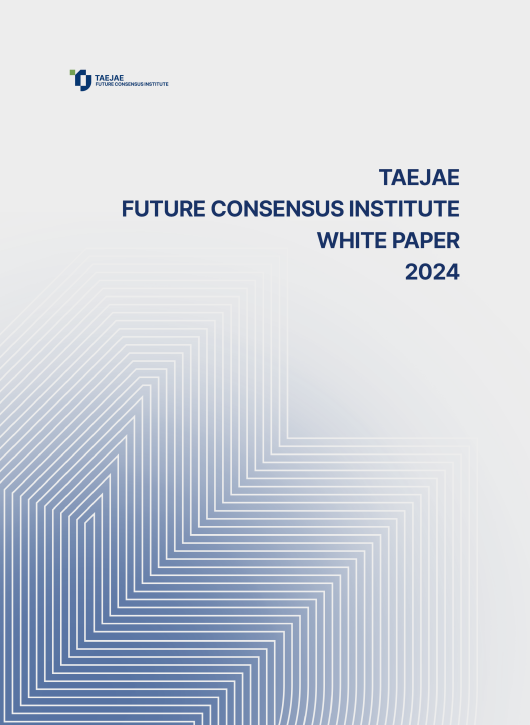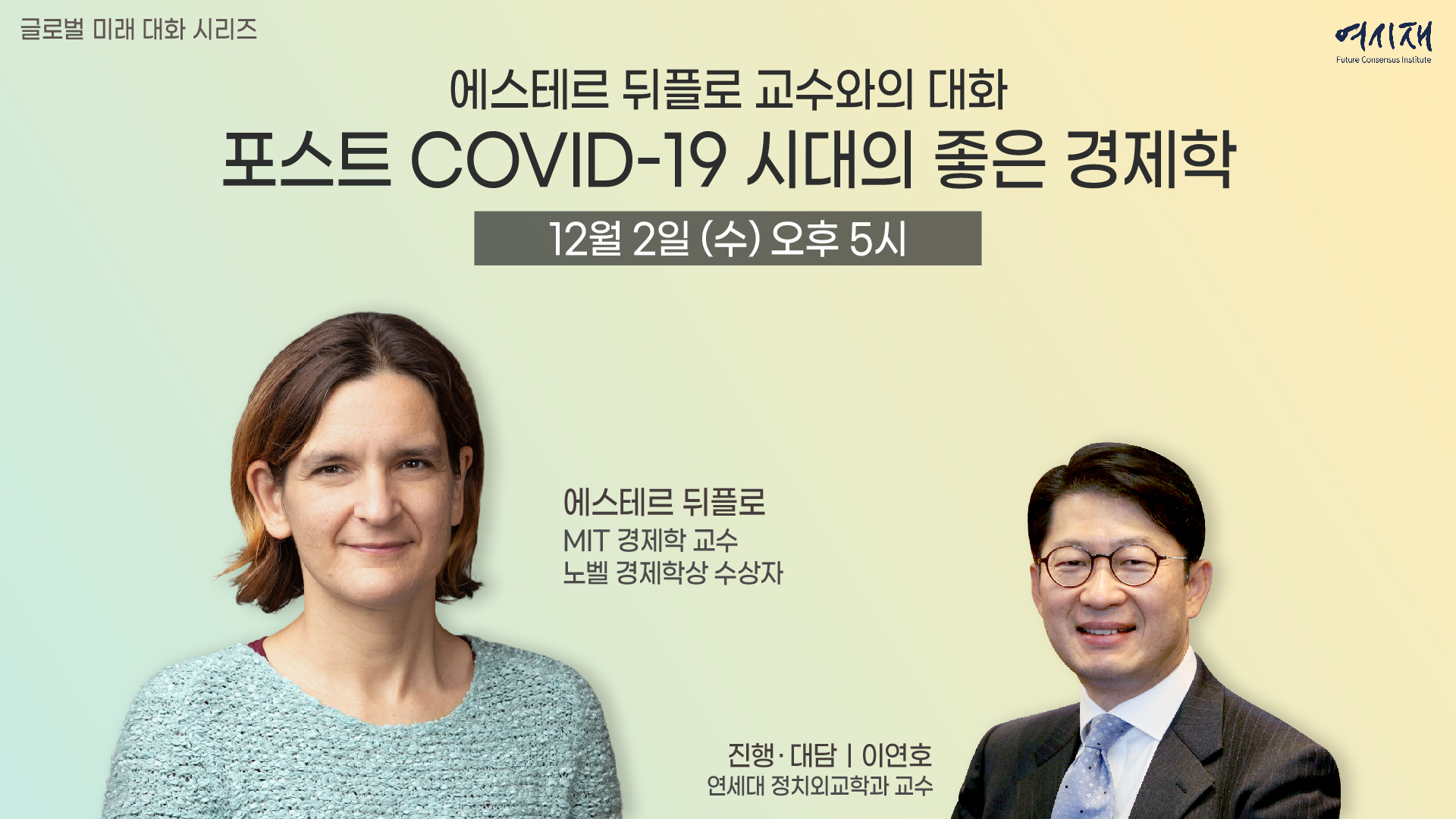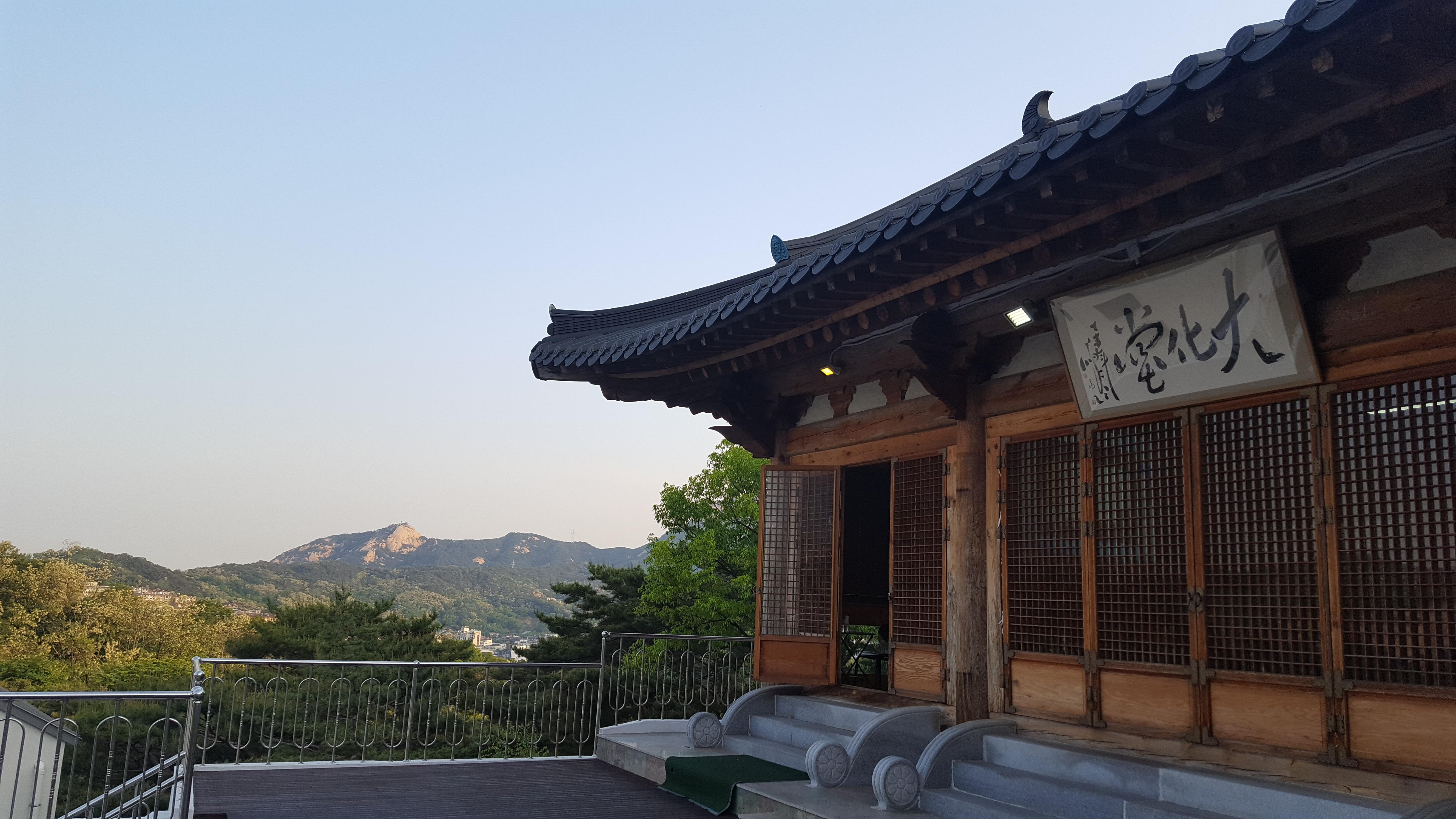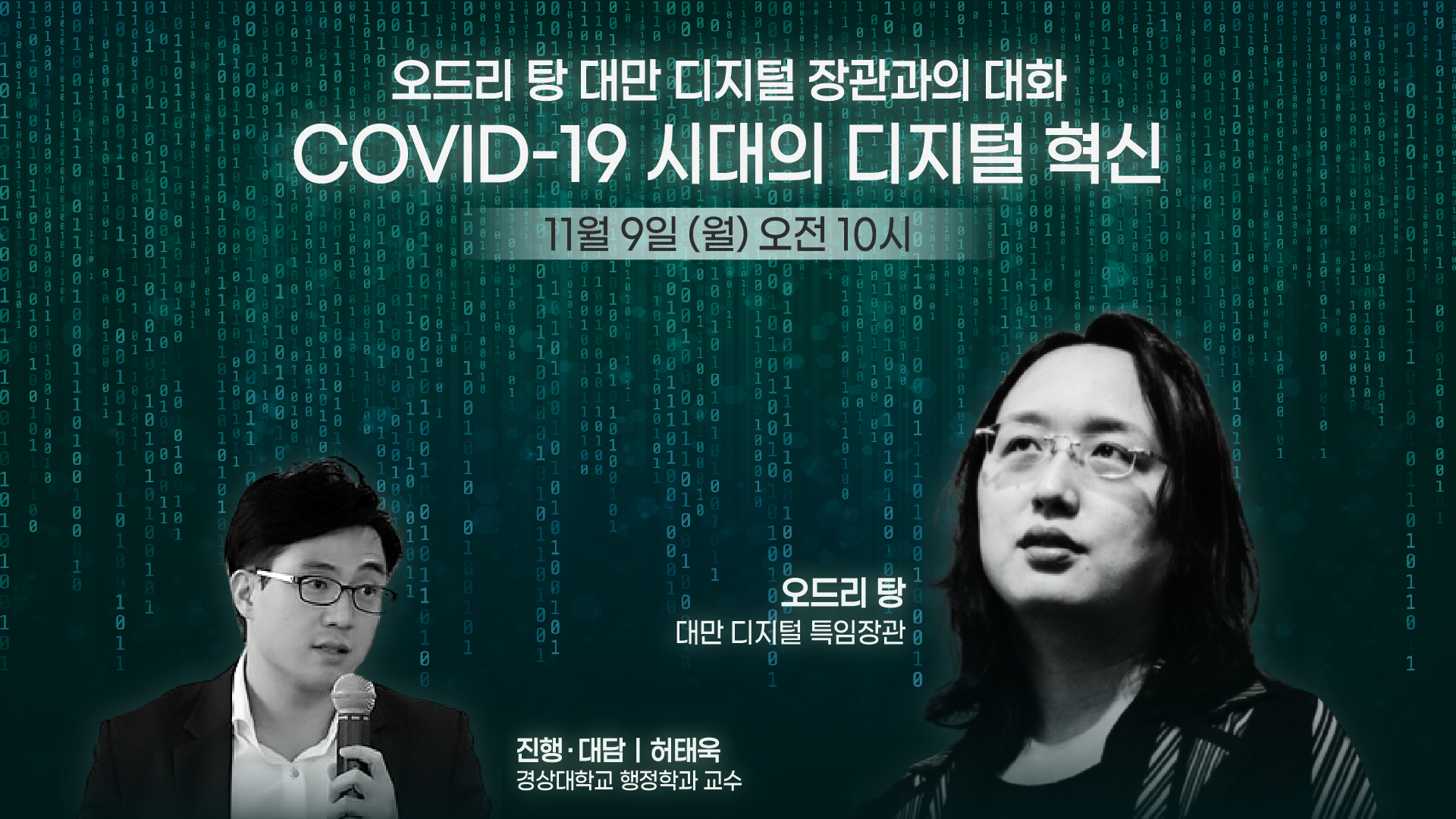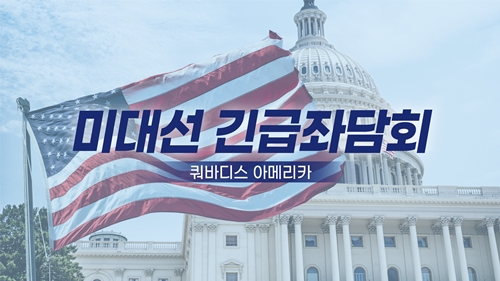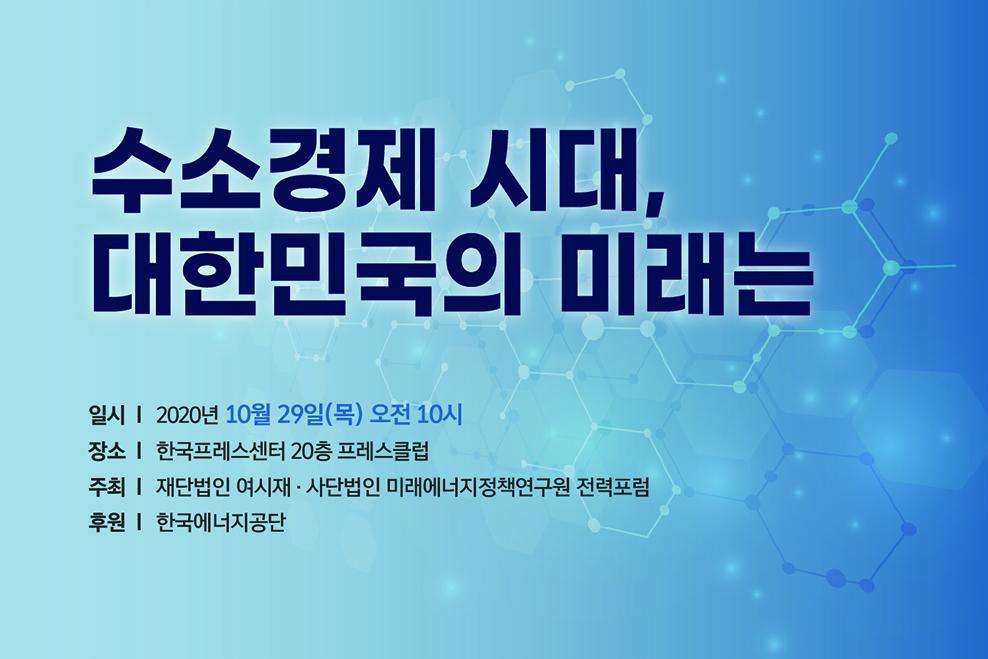Please join Yeosijae as we build a brighter future for Korea. Create your account to participate various events organized by Yeosijae.
- Insights
- |
- Next-Generation Values
[New Value Research ① | The caste system of the so-called ‘meritocracy’ is an obstacle to progress]
Where does South Korea stand?
The Future Consensus Institute (Yeosijae) has been working with a writer and an expert in the business environment, Eun-Hwan Kim, to conduct research on the topic of “a new value system in an era of great transition”. Great transitions are already well into effect in places both in and out of sight. The great transition has been dubbed ‘Digital Transformation’, but the name fails to capture the entire scope of changes that are occurring. Likewise, the present study on the ‘value system’ is only in its early stages. However, the recent outbreak of Covid-19 has helped to refocus the targets of our questions to more fundamental levels of discourse.
How do we define ‘value’ and is it imperative that we do so? What values have become part of our lives? What do we need to prepare? This paper, the first in a series of papers, aims to utilize this opportunity to raise the questions mentioned above.
|
Eun-Hwan Kim graduated from the College of Business Administration at Seoul National University and received his master’s and doctorate degrees from KAIST and Sung Kyun Kwan University. His expertise is in organization theory. He has spent much of his career in the Samsung Economic Research Institute (SERI), where he worked as the director of management strategy and industrial strategy. He has since become a writer, publishing ‘Evolution of Enterprises: Where Do Enterprises Come from and Where Are They Headed to?’ in 2017 and ‘Hidden Players of Industrial Revolution’ in 2019. |
Ecdysis: a risky, life-threatening venture
Some animals, such as crustaceans and reptiles, undergo ecdysis—or molting—as their skin does not expand to accommodate their growth. A quick look at their life cycle may lead to the assumption that their skin has grown in sync with the body’s growth. However, the process isn’t as simple as it may seem. Ecdysis is a life-threatening, precarious venture.
Ecdysis is especially a dangerous undertaking for insects due to their complex body structure. During the process, the old exoskeleton may get stuck with a part of the body, result in deformities and even death. The shedding of the skin, with its nerves intact, has been described to be similar to having one’s lungs ripped out. Though their bodies may not be visibly scarred, they have endured pain and suffering to grow.
Implementation of global standards
was also ecdysis
Human civilization engages in a similar process to ecdysis, with socio-economic developments as its ‘growing body’ and its policies, culture, and values as its ‘skin’. The ‘social skin’, for some time, can withstand the gradual ‘growth’ of the ‘body’, supported by ‘logical coherence’ that keeps it together. However, the painful process of ecdysis will eventually have to begin.
South Korea has undergone ecdysis on two occasions: once during the post-Korean War period with industrialization and rapid economic growth, and the other following the Asian Financial Crisis with regulatory reforms and implementation of global standards. Now, with the arrival of ‘Digital Transformation’—or the Fourth Industrial Revolution—there is a growing consensus that South Korea is at a beginning of a new molt cycle that will, once again, fundamentally change its values and its policies. All things considered, the outbreak of Covid-19 may have been unexpected, but it was a shock that was predestined.
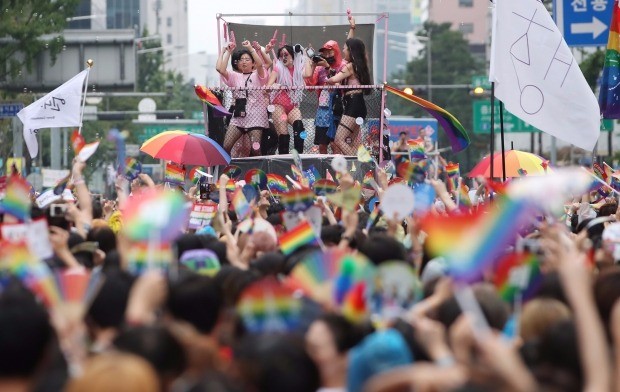
The initial crack begins at the front line of value conflicts
Tensions that lead to the separation of the cuticle from the epidermis are unevenly distributed throughout the body. Consequently, the skin begins to rupture where the tension is strongest. In this case, the initial crack would occur in the front lines of value conflicts. Conflicts in today’s world mostly stem from issues regarding social minorities. A case in point are the sexual minorities: the LGBT (lesbian, gay, bisexual, and transgender) community or the “queer”. The discourse goes beyond the scope of minority protection. When same-sex marriages were legalized in the United States, then-president Barack Obama tweeted, “Gay and lesbian couples now have the right to marry, just like anyone else.” Through the tweet, President Obama celebrated the expansion of the universal right to marriage.
Marginalized minorities have always been at the front line of change in the history of Democracy. Once limited to the upper class or the “bourgeois”, the right of suffrage has been extended to the petit-bourgeois, the working class, woman, and the people of color. Each suffrage movement was led by the political minorities of their time, who fought at the front lines of value conflicts. Their stories were not just victories for individual minority groups, but a development of Democracy.
From traditional to secular-rational values, what is next?
We carry on with our lives every day, taking air for granted, but when fine dust starts to pose a problem, air quality becomes an important issue. The same principle can be applied to values. Values are standards deeply embedded within our consciousness, used almost unconsciously in our daily lives. When social development comes into conflict with our values, it becomes a hot topic of debate. Then how can we define value?
The World Values Survey (WVS), a private research institute headquartered in Vienna, Austria, has been studying the values of each nation throughout the world for the past 40 years on a 5-years basis. They have presented their concept of ‘values’ under the following framework:
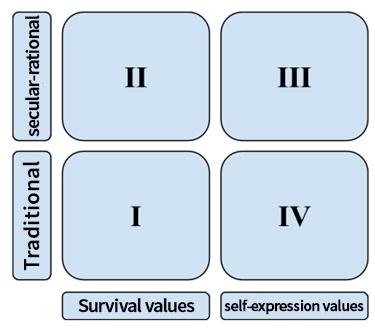
The y-axis tracks traditional values versus secular-rational values, indicating deference to traditional authority or an emphasis on rationalism with materialistic standards. Most societies in the modern world are moving towards secular-rational values. Some Muslim nations still have a strong emphasis on traditional values, but with Saudi Arabia’s recent decision to grant women the right to drive, a pivotal opportunity for the nations to resume the transition into secular-rational values has been made.
The x-axis transitions from survival values to self-expression values. These values reflect whether a society places a high priority on the matters of survival or on self-expression, where individuality and personal preferences are respected and individual lifestyles are pursued. Environmental factors, such as the economic status of the society, have an impact on these values, but that is not always the case. A wealthy, powerful individual may give priority to survival, while a poor individual may pursue his or her own style of life.
Combining the axes creates a quadrant chart. Placement in quadrant I indicate an emphasis on traditional and survival values. This translates into a society that has a strong emphasis on religious authority and lower levels of economic power, characteristics that are often seen amongst less modernized societies. Quadrant II indicates a shift from traditional authority to secular values, while the importance of survival still outweighs self-expression. In such cases, materialistic successes are highly regarded, whereas values regarding individuality and freedom fall behind in terms of importance. Quadrant III moves away from the pressures of secular competition to pursue individuality and freedom, and people endeavor to develop their own identities; whereas in quadrant IV, deference to traditional authorities remain strong while people are free from competition and work, to be “content amid poverty” or to live by the idea of “carpe diem”.
Drawing from the research, the following is a map of the values held by each country:
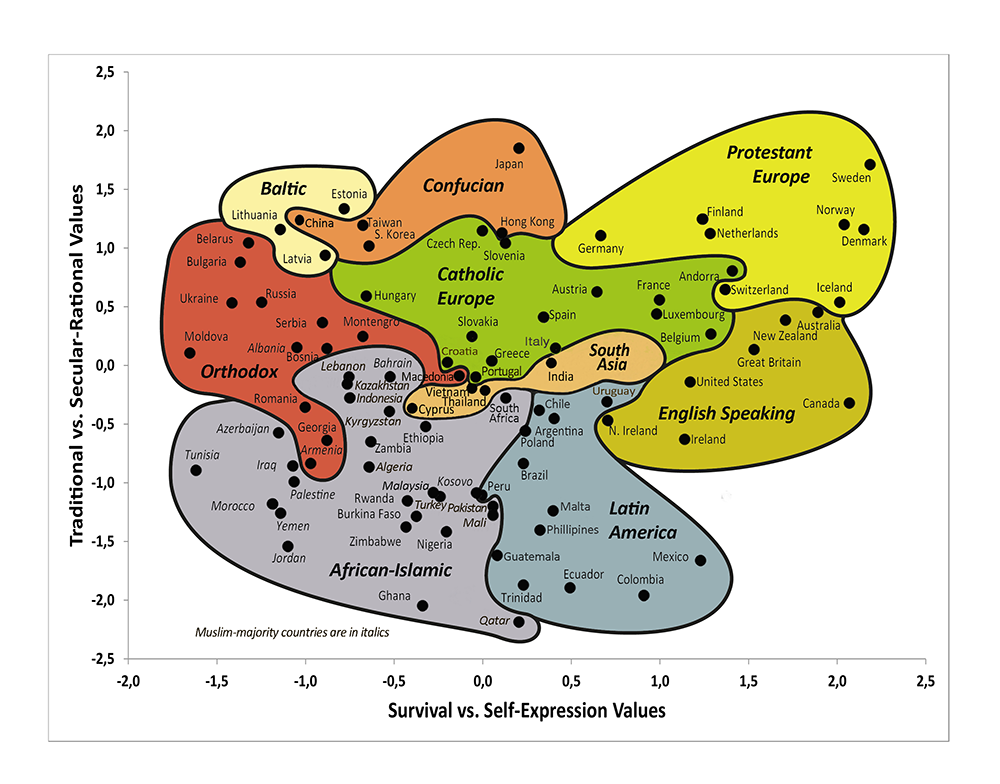
Islamic nations are located in quadrant I, while Orthodox European countries (former Soviet Union states) and Confucian countries are in quadrant II, Protestant European countries in quadrant III, and Latin American states in quadrant IV. The map seems to correspond with common sense and stereotypical images of each society. The World Values Survey recognizes the relativistic nature of values and, therefore, does not acknowledge a superiority relationship between them. However, it does believe that there is an overarching trend in how values are changing. Countries, over time, have leaned towards the upper right side of the chart, thus leading to the conclusion that progress is leading societies towards “secular-rational and self-expression values”, or quadrant III.
Values in quadrant III are significant in that they are in line with the values apt for ‘Digital Transformation’, or the Fourth Industrial Revolution. In the age of high growth and mass production, rationalism and competition-oriented values played a dominant role. However, the Fourth Industrial Revolution promises a completely different landscape, such as the ‘long tail economy’, normalization of innovation, and downsizing of organizations. Moreover, if humans in basic labor jobs are replaced with artificial intelligence, people will have to perform more humanistic activities that demand creativity and uniqueness. The traditional mindset of competition based on quantitative performance would be an unsuitable environment to nurture such traits.
Where does South Korea stand?
In that regard, the trend in which values change could be summarized as the following:
1. A shift from traditional authority to materialistic rationalism; this process leads to industrialization, and lower-value added industries that have been transferred from advanced nations will form work ethics that praise diligence. Such trends are visible in the Middle East/African region and are similar to the trends that have been observed in post-Soviet states that are making a transition into capitalism and South Korea during the ’70s when it was undergoing a high growth.
2. Improvements in income levels, and a reflection on the workaholic business culture; keywords that promote personal life such as “YOLO” and “Work-Life Balance” emerge, and people cast aside their promising careers to pursue their own lifestyle, including migration to rural areas. However, these movements occur outside the main boundaries of life, limited to leisure times and private life.
3. Personal interests and causes generate common interest within a community, which further expands to include social issues including the environment, human rights, and inequality; hobbies start to become formal models of business, e.g., “makers” and start-ups. Diverse opinions are voiced and issues are raised, lending political strength to the voices. Self-expression of individuals leads to the maturity of the community, and the maturity of society as a whole.
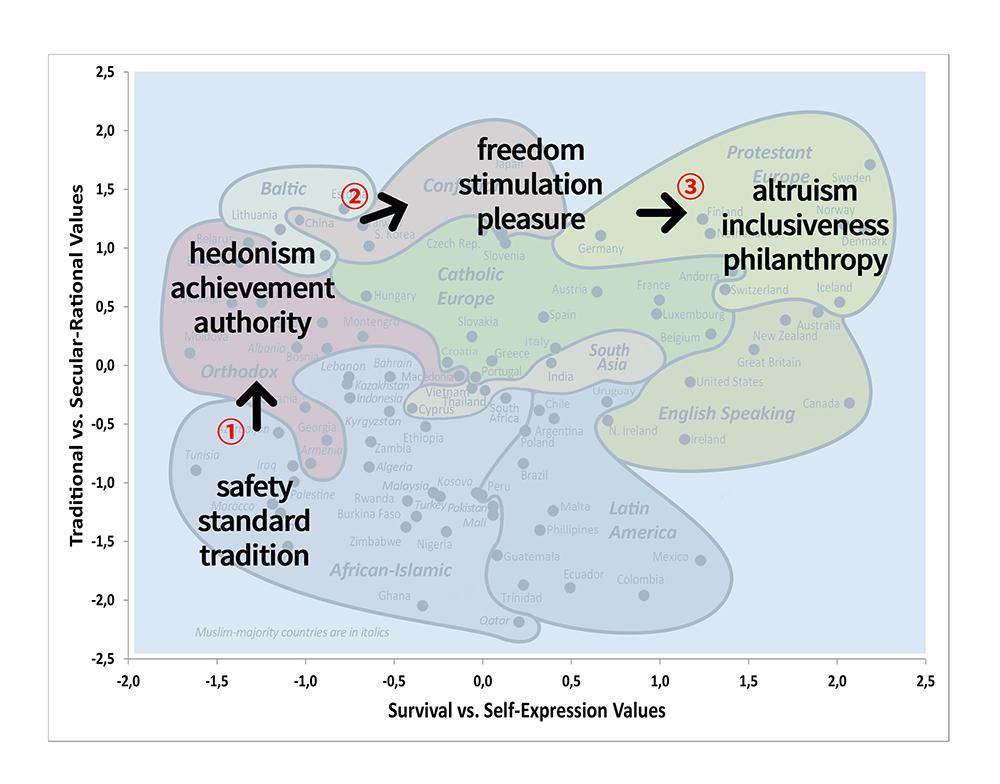
This brings us to the question of where South Korea stands now. According to the World Values Survey, South Korea is currently undergoing a transition from stage two to stage three, along with other East Asian countries in the Confucian block. This means moving away from hedonistic values that prioritize freedom and pleasure, to pursue altruism, inclusiveness, and philanthropy. Improvements in the quality of life will have to expand beyond the personal scopes of individuals to encompass society as a whole. However, the findings show that South Korea is still hovering around stage two. There is little change between the data today and those that were collected in the 1990s. Compressed growth allowed South Korea to escape poverty, but “the middle-income trap” had stopped it short of becoming an advanced nation. Similarly, traditional values rooted in Confucianism had smoothly transitioned into more secular-rational values, but much remains to be done to reach the goal of self-expression values. There are indications of developments that fall within the scope of stage two amongst individuals, but movements that mobilize communities – or signs of stage three—have yet to appear.
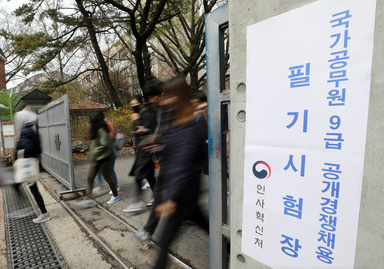
the civil service exam (Source: Newsis)
Innovation cannot flourish in a society that draws a definite line
between the normal and abnormal
What could be holding back the development of South Korea’s values? Or are the developments simply stalled? What is undermining the transition into a set of values that embrace the age of big data and artificial intelligence? The outdated models of the past, ground in the diligence of a workaholic, are no longer effective in catching up to the models of advanced nations. We are now in the age of micro-trends, where market segments are granularized and mega-hit items have a lifespan of just one to two years. This age demands a fresh start, with a clean state of mind that has forgotten the successes of the past. Values that prioritize fun and enjoyment and encourage daring adventures may appear to be appealing, but it has a level of uncertainty that those who seek a stable environment will find unbearable. It is why young people, in the search of employment stability, flock to civil service exams. It is difficult to move away from survival values and move towards self-expression values.
Nevertheless, the socio-economic paradigm shift brought on by ‘Digital Transformation’ will contradict a mindset that zeros in on job stability, and cracks will appear throughout society. The news surrounding the conscientious objection to military service and the admission of a transgender student to a woman’s university may seem irrelevant to the discussion. However, these are the weak links in our society, where ruptures are appearing due to the underlying tensions. In a rapidly changing world such as ours today, social infrastructures that can accept and embrace diversity is in need. These ideas are contradictory to our traditional values that draw a strict line between what is “normal” and “abnormal” and leverage the solidarity between those perceived to be “normal” to resolve problems in the society.
Social inclusion of minority groups, not only is a matter of respect for minorities but a problem that has to be addressed for the sake of the whole society. Diversity-intolerant societies will not be able to encourage free thought and will limit the boundaries of creativity. Innovation will not be able to flourish in a society that draws a clear line between the “normal” and “abnormal”.
Superficial fairness
mask unfairness in practice
Just as self-righteousness and arrogance of absolute monarchs posed problems in the past, the superiority complex surrounding the idea of ‘normalness’ and the ‘social pecking order’ formed by meritocracy have become problems in the modern world. Meritocracy emerged as a symbol of the progressive movements to resolve the unfairness of the caste system. However, in a world where income inequality leads to inequality in educational attainment, which in turn further exacerbates income inequality, the idea of fairness has been distorted significantly. In spite of this, the reverence for the “miracles of meritocracy” remains strong in South Korea, due to the blind faith people have in the value of educational attainment. Under the name of meritocracy, the outdated system of exams, though unapt for the age of AI and big data, continues to be the last stronghold against fairness.
There are already sufficient numbers of warnings against the “miracles of meritocracy” in advanced nations. Daniel Markovits, a professor of law at Yale Law School, presented a commencement speech titled “A New Aristocracy” to the graduating class of 2015, denoting meritocracy as a “modern-day aristocracy” and a “caste order” that promotes education and talent for the benefit of a few. Students’ ability to solve mathematical equations within a limited amount of time, though they could be solved easily with the use of a simple application, determines the schools they will attend and ultimately, their future. This greatly impedes our ability to prepare for the future of our society and force our society to remain in the past.
At the very least, unfairness in an aristocratic society was apparent in that blood ties were the sole determinant of one’s destiny. However, in a meritocratic society, unfairness is obscured by superficial fairness. The moral justifications for meritocracy enable the ruling class to reap its benefits and eagerly accept the polarization of wealth, leaving the rest of the society to cling to the outdated system of meritocracy and engage in a fierce competition for merits. In the future, a significant amount of time and resources will be wasted on the competition to memorize utterly useless facts.
The inability to let go of outdated perceptions of fairness is
the biggest hurdle for the development of values in South Korea
South Korea is unable to move beyond the outdated perceptions of fairness, and this is becoming a major impediment to the development of values. Despite the improvements in income and living conditions, the intense battle to stay ahead in the competition in the merit-based environment continues for most people. Winners of the competition are guaranteed a better life with no qualms about the outcomes, whereas the losers are left with very little. Only the ‘losers’ of the competition question the broken merit-based system and procedures, and present alternatives. Like the bone-rank system of Silla and other caste systems, the merit-based system creates a hierarchical society where the outcome of competition determines the social order. Such an environment is ill-suited for the development of communities as people are left with no options but to fight for their own. Self-expression would be confined to the realms of personal life, as the terms “YOLO” and “Work-Life Balance” represent, with little prospect of growth into the realms of community or social movements. This may explain why the development of values in Korea has been static in recent years.
Evolution continues
However slow it may be, evolution is a massive force that cannot be stopped by a group of policymakers or by the ruling class. Ruptures in society, that are currently limited to the social minorities and individuals, will gradually spread along the fault line, just as glaciers that appear static chip away at the mountains and fill valleys. However, that should not serve as an excuse to sit on our hands and wait for change to occur. The dangers of incomplete ecdysis have been mentioned before. Moreover, socio-economic developments can lead to change in our values but can also become the shackles that impede progress.
Therefore, the importance of values cannot be understated. There is a need to assess the underlying values behind various phenomena appearing throughout society because all of our judgments are rooted in our values. Over time, our values will gradually change, conflicts will arise, and contradictions will appear. This will lead to inconsistency and create confusion. The most basic notions of fairness will be shaken to its core. While there will be movements to create new values, existing values may be reinforced to shy away from the chaos and confusion. Signs of change, as a result, will be stigmatized as an object of hatred and scorn.
Hatred against the socially disadvantaged and minorities will escalate, and social values will contradict the values of a pluralist society, where acceptance and inclusion of diversity are the norm. Just as glacier movements are affected by their surroundings (e.g. geographical features), we must be wary of the fact that development can also take different paths depending on the circumstances.
On the bright side, key institutional changes regarding values that have been unimaginable in the past, are occurring in South Korea. The Supreme Court’s decision that permitted individuals to change their legal gender status and the ruling that acquitted conscientious objectors to serve their country in alternative ways were some of the important decisions that have been made. Though it has been overlooked, one case that particularly stands out is the ban on forcing students to write “apology letters”, a decision that was expressed in the Ordinance of Rights in Schools and the meetings of the National Human Rights Commission of the Republic of Korea. With the ban, teachers can no longer force students to write apology letters. Genuine apologies are voluntary actions that cannot be forced by others, implying that ‘forced apologies’ are virtually valueless. The decision reflects the idea of “freedom of conscience”, which has been developing for several hundreds of years in Europe, and though it is belated, the decision represents a significant step in progress, especially for the children of growing age. Some teachers opposed the decision, claiming that it will harm the teacher’s authority in schools, but such claims fail to understand that humans are free to be themselves, on the condition that they do not harm others. While there is gradual progress that is being made, it is clear as day that there is an unmistakably long stretch of rough roads ahead of us. Perhaps the example of the Sun King of France, Louis XIV, whose persecution of the Huguenots hurt France in the coming Industrial Revolution, may offer insights into our future.
< Copyright holder © TAEJAE FUTURE CONSENSUS INSTITUTE, Not available for redistribution >

